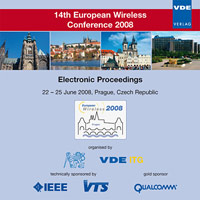Energy Balance in Cooperative Wireless Sensor Network
Konferenz: European Wireless 2008 - 14th European Wireless Conference
22.06.2008 - 25.06.2008 in Prague, Czech Republic
Tagungsband: European Wireless 2008
Seiten: 5Sprache: EnglischTyp: PDF
Persönliche VDE-Mitglieder erhalten auf diesen Artikel 10% Rabatt
Autoren:
Bai, Lu; Zhao, Lian; Liao, Zaiyi (Electrical and Computer Engineering Department, Ryerson University, ON, Canada)
Inhalt:
The design of Wireless Sensor Networks (WSNs) should focus on energy efficiency since wireless sensor nodes work on limited batteries, which are difficult or impossible to replace in most situations. However, the performance of WSNs is adversely impacted by fading effects, which requires much energy to combat for a high Bit Error Rate (BER) requirement. On the other hand, since the transmit energy is proportional to transmit distance, energy imbalance is caused by the different distances to the Base Station (BS). Sensor nodes far from the BS consume much more energy than those close to the BS and may die out quickly, which shortens the lifetime or results in a malfunction of the WSN. Reducing the proportion of transmit energy in total energy consumption helps minimize the differences in transmit energy among sensor nodes. Cooperative transmission has been proven to be an effective way to combat the impacts of fading by obtaining diversity gains and therefore, reduces the transmit energy. In this paper, we first apply cooperative transmission in WSNs, which not only reduces energy consumption but also lessens the differences of energy consumption among sensor nodes. To further balance energy among sensor nodes, we apply different cluster size and simulation results show that unequal cluster size improves energy balancing.


